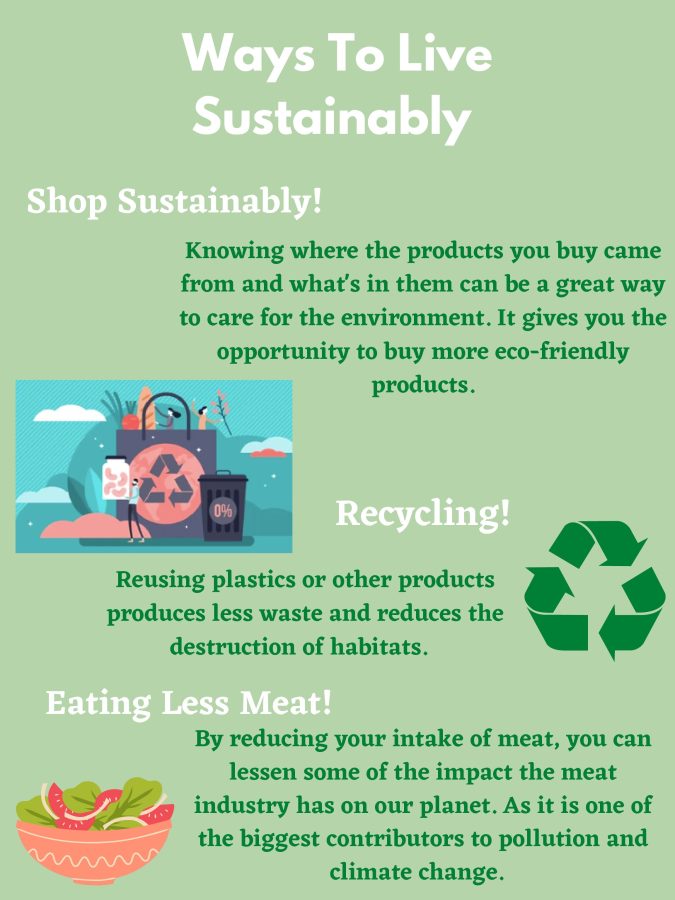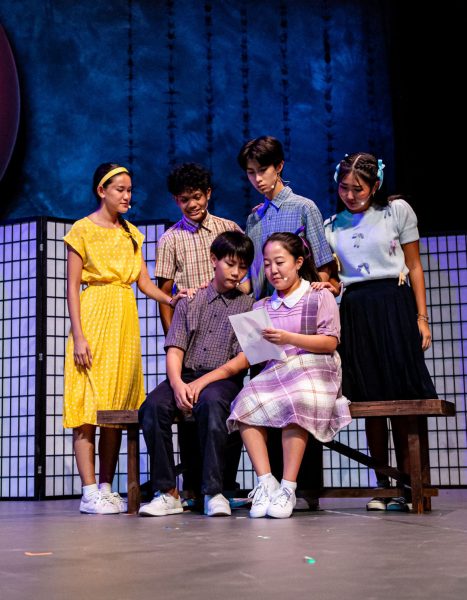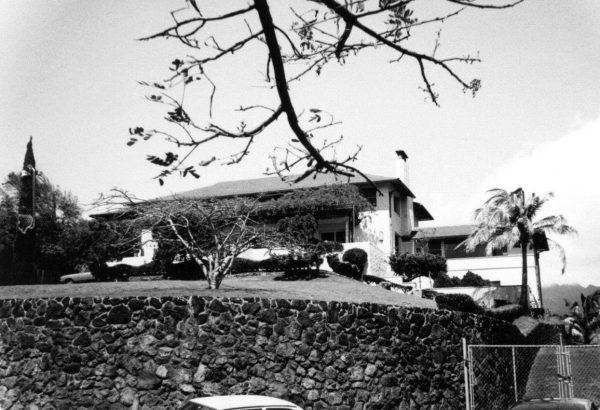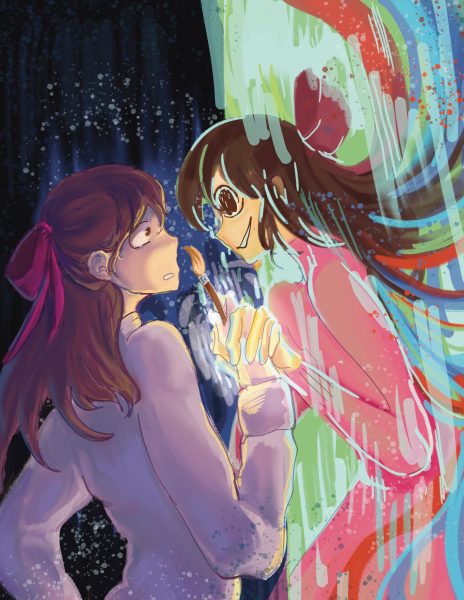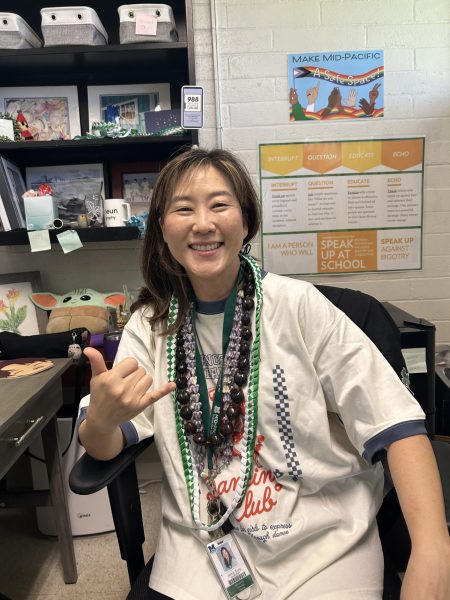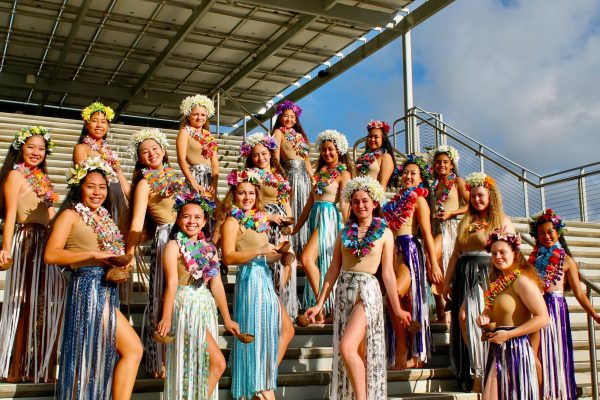Working towards a sustainable future
Infographic by Josephine Brewer
Ideas to live sustainably in every day life and personally take a hand in being environmentally friendly.
By Josephine Brewer
Staff Writer
The middle of the night, the sound of cracking followed by a loud crash can be heard by the whole neighborhood. This is what occurred when a North Shore home collapsed onto the beach due to coastal erosion.
Students and teachers at Mid-Pacific care for the environment in a variety of ways, and one of them is the effort to live sustainably.
Some Mid-Pacific students have joined the Leaders of Environmental Action for the Future club as a means to learn how and help others live sustainably.
LEAF club president Eli Stein said his passion for protecting the environment started since he grew up surfing, paddling and being around the ocean.
“I kind of was very captivated by the fact that, you know, our planet is being destroyed by this issue [pollution and climate change]. So I wanted to first look at ways that I could help out within our school and also look at ways that could help out inside the community,” Stein said.
This inspired him to join the LEAF club of which he eventually became president.
The club works together to make small changes towards a more sustainable Earth.
“As we continue to get older and time elapses, global warming and climate change will prevail as an issue that impacts not only our generation, but the future generations to come,” Stein said. “So we need to take the steps right now as soon as possible to prevent those future consequences.”
Classes also offer another way to live sustainably. One of the high school science courses offered at Mid-Pacific is aquaponics, which is taught by ‘96 alumnus Gregg Kaneko.
Aquaponics is the growing of fish and vegetables in a closed system. It’s a circulating system where the fish waste fertilizes the plants and the plants clean the water for the fish.
“It’s very water efficient. It uses 90% less water than traditional farming or gardening, because it’s recycling the water,” said Kaneko.
Gardening can be a very efficient way to recycle.
“We have a compost bin and my mom is a gardener. So we grow some vegetables and the food we don’t eat, we compost that into fertilizer,” said sophomore Maggie Ho.
Another way people make their lifestyle more eco-friendly is by shopping sustainably which can be important in reducing pollution, plastic waste and saving natural resources.
Sales worker Leah Salindong has been working at Keep It Simple, a zero waste store located in Kaimuki and Waikiki. She has worked there since January this year but has shopped there since the store opened.
Salindong explains what it’s like to work sales there on the daily.
“I keep it simple. Just [explaining] the reasons why you want to buy sustainably or why maybe buying bulk refills might be better for your family, just introducing it,” Salindong said.
She says there is more to her job than selling organic and non-polluting products.
“I think educating people is a big part of this job too. Telling people why it’s better to choose eco-friendly products and just choosing to be more friendly to the environment in general,” Salindong said.
People can also shop sustainably outside of zero waste stores.
“My family and I try to buy food from local farmer’s markets. Just because I think it’s important to support the local farmers here on the island. In that sense, you don’t contribute to the need to transport food from the mainland, which really contributes to global warming and pollution,” Stein said.
For some, shopping more thoughtfully is the only option as zero waste products can be more expensive than using what people already have at hand.
“Some people have maybe more important things to worry about. If you have financial issues, I mean, that’s going to be more of a concern than trying to live sustainably right. Trying to pay our bills is probably more important,” said Kaneko.
Feeling like there are other things to worry about or simply forgetting about seeking out a more eco-friendly lifestyle is not uncommon.
Although one person living sustainably doesn’t make much of a difference over all, as more people make more sustainable lifestyle choices, Earth’s future slowly gets more viable.
“This is a problem that impacts everyone. And it’s not an it’s not an easy issue to tackle at all,” Stein said. “In order to create change, we need to have the discussions to become aware of the issue to discuss the solutions, and ultimately to come together as communities and as one to solve the issue.”
Salindong says it’s incredibly important to respect the environment and she embodies principles familiar to Hawaii such as Malama ‘Aina.
“The land is giving to us. You can’t just like take and take and take without giving back,” Salindong said.
It can be difficult to get started but taking a crack at a more sustainable lifestyle can be an act of responsibility.
“Earth is home to us. And we forget that because we get lost in how big the world is. But if we can take care of our communities and take care of a place that we call home, that’s the best thing you can do,” Salindong said.
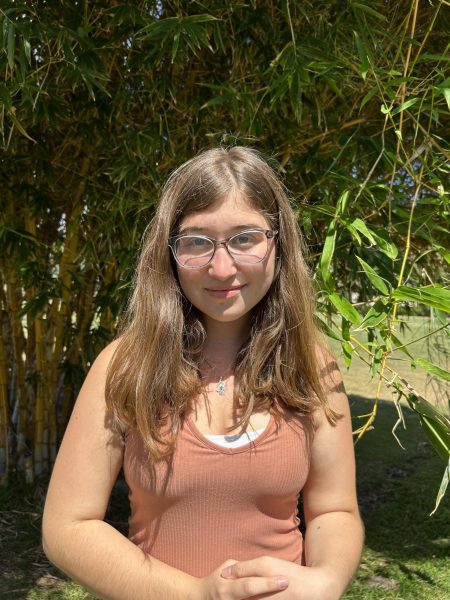
Josephine Brewer is a senior and fourth year journalist. Outside of school she likes to play guitar, read and spend time with friends. This year she is...

